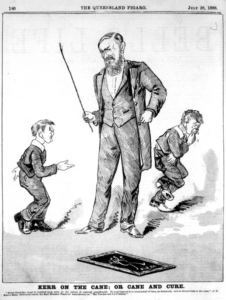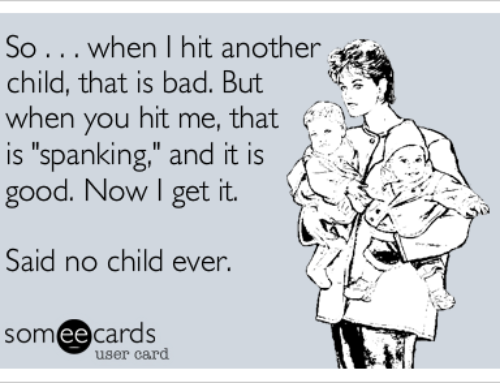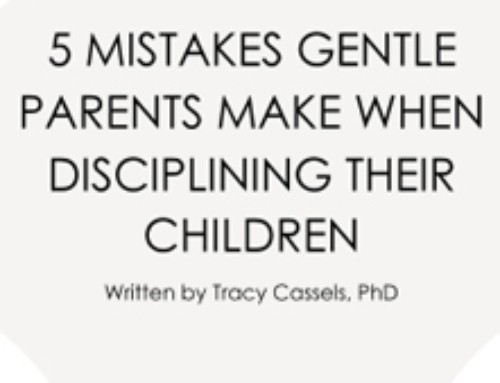
There is a movement afoot to move away from punishment as lots of people are learning the benefits of gentle, respectful, and logical parenting practices. But for many the issue of punishment is one they just don’t see. They can’t understand why punishment doesn’t work. This isn’t too surprising given that in the short term it can seem to work very well, especially with younger children. So why would anyone speak out against a method that seemingly can make your life easier and do what you believe is best for your child?
Punishment is Illogical
We have to be clear here that punishment is not the same as natural or logical consequences. To understand why punishment is illogical, we need to first examine what natural and logical consequences are. A consequence is something that happens because of another act and these can be divided into three types of consequences: natural, logical, or illogical (aka punishment).
Natural consequences happen no matter what anyone does so you actually are not an active agent in this unless you stop natural consequences from happening (which is common too). An example of a natural consequence is a child refusing to wear a coat outside in winter and then getting cold. What’s important to know about natural consequences is that we are primed to learn from them as humans – in fact, they are the best way for us to learn lessons. So looking at that coat example, if you don’t fight the coat issue but bring one with you, once your child is cold, she should look to you for the coat unless you’ve already turned it into a power struggle and so she refuses on principle.
The other two types of consequences are artificial in nature in that they are imposed by others, but can follow as either logical or illogical. Logical consequences are those that make sense when considering the action in question. For example, if your child doesn’t eat any healthy food, it’s logical to say they can’t go and eat tons of dessert. You can explain this to them in terms of health and how food impacts their body. In addition to making sense and being something you can link when you explain, it also has to be temporally logical. That means, you can’t take away dessert for a week for one night of not eating dinner because it then loses the logic.
Finally, we get to punishment, or illogical consequences. These are the many consequences we try to impose that have nothing to do with the problem at hand. We are using our power to try and take something away from a child that they want to get them to comply with something completely different. For example, you may see people take away toys or TV time for not eating dinner. You will often also see people threaten to take away future events for some current compliance (“If you don’t get ready right now we won’t go to the fair this weekend”). These are very common and yet make absolutely no sense unless we simply view it as a means to exert our control over our children.
The research we have on moral development is quite clear that children simply don’t learn anything of moral value when the consequences are not logical. That is, punishment does teach the lesson about what dicks we can be as parents to our kids, but it does nothing in terms of aiding their moral or social development. Nothing.
But What About the Momentary “Good”?
Some parents may wonder if the greater good in the moment is still worth it if they are getting children to comply with something important. After all, eating good foods is important. Not getting sick is also important. However, this is where we have to be good about looking at the short-term gain versus long-term pain because in almost no instance can we see that it’s worth it.
What happens when we use our power for punishment? Our children may comply in the moment, but we know they aren’t actually learning anything about the message we are sending. They are not learning, for example, that eating healthy foods is important. They are not learning that hitting people harms them. They are simply learning that being bigger means exerting power that isn’t fair. So already you’ve set yourself up for a longer socialization battle because your kids aren’t actually getting the lessons you think you’re teaching.
The second issue reason you end up with longer-term pain is because you’re actually turning these important issues into a power struggle. You’re making them flashpoints for your kids and they will not only not learn, but can get to the stage of flat-out defiance (even against their better judgment of what’s good for them) in order to spite you. And as they get bigger, your ability to control them becomes less and less. They are out of the house more, they are physically stronger, and that power you were wielding for so long becomes moot.
So you may have gotten your 2-year-old to eat lunch regularly, but if you keep up with these methods, you can very well end up with an angry, resentful 6-year-old who not only refuses to eat lunch but no longer listens to you for anything. When we use punishment regularly, our kids don’t see us as someone to learn from, but someone to get away from and trust me when I say you don’t want this as your kids gets older.
The Dangers of Punishment
You also have to face the fact that punishment becomes ineffective over time. Children adapt to punishment – still viewing it as unfair, mind you – and just accept it without giving in to what you are trying to accomplish. Suddenly one day you have a child that says, “Fine” when you threaten to take away TV because they’ve gotten used to it so much that it’s no longer so negative. Then you have to up the ante.
This can get quite dangerous.
In fact, one of the biggest concerns with the use of any harsh parenting methods, like spanking, is not the immediate harm from using it once, but the massive increased risk of more spanking and even harsher corporal punishment down the line. Even when it’s not corporal punishment, but removal of privileges and so on, we also see a danger in the future: our relationship with our kids. This goes back to the issue of punishment being illogical and how punishment is perceived. Because of the inherent lack of logic to it, then our kids only see the action as cruel and this hurts our relationship with them. You don’t get a positive, secure attachment with someone you find to be hurtful and this is likely why research suggests that when we include expected punishment, children are more apt to lie about things than when punishment is not on the table.
This lack of positive and open relationship means we cease to be the people our kids come to in times of need when they are older, and this can be terrifying for parents today. We take it for granted that teens in our culture of distant and moody and don’t share with us, but this is actually a cultural norm, not a biological one. Yes, there’s a greater move towards independence in the teen years (naturally so), but independence is not the same as shutting others out or turning solely to one’s peers, which is the common attitude in Western culture. However, parenting through punishment leads to this outcome more often than not, but it doesn’t have to be this way if we start out disciplining from a place of compassion and respect.
Putting It into Practice
This is often the hardest part for people because they fear being permissive and they face a society that is so enmeshed in punishment that it seems like you are wrong for not following along. The thing is that you don’t need to punish to parent effectively and in fact you will parent better if you remove it from your toolkit altogether.
First things first, remember that outside of immediate safety, nothing is catastrophic. Your child doesn’t want to eat lunch? Yep, it can seem awful in the moment, but that moment will pass and life will continue. We have a tendency to catastrophize things that we fear and so we think horrible things will happen if we cave on any little thing. Now, I’m not going to suggest there won’t be any consequences, but they are rarely as dire as we believe. A hungry child can tantrum and be downright grouchy, but is avoiding that worth the risk of punishment?
Second, we all cope better when we are prepared. If you find yourself using punishments, take a week and just jot down the times when you are most prone to using them. Is it food-related? Is it when you’re in a rush? What is happening that triggers you? Once you can get that information, get prepared to avoid the problems if you can and set up logical consequences for those moments you can’t. If your child doesn’t ever want to eat at the table, then you have to decide – is his eating more important than where he eats? If so, then set up a picnic either outside or inside, but change it up to make it fun for him. If you’re short when you’re in a rush, examine why you aren’t getting prepared and ready to go earlier. Perhaps you need an extra 15 minutes to leave the house – account for it and avoid the stressed rush.
Sometimes you’ll need logical consequences because the natural ones aren’t so desirable (but natural should always be preferred). I know brushing teeth can be a massive battle at bedtime for people and so you can either set up fights every nighttime or just set your logical consequences (sadly the natural consequence of cavities is one most people would like to avoid from a health and financial perspective). No brushing teeth? No sugar and always try brushing in the morning so you always get one brush in per day and the logic of no sugar until they are brushed. Use it as a way to explain how foods affect bacteria in the mouth and what that means for your child’s health.
Third, don’t get mad. Easier said than done, but definitely easier when you are implementing logical consequences. The thing about punishment is that we can’t justify it and so we ourselves get flustered and upset which just makes the whole thing worse. We dig ourselves a hole and have no way to explain our reasoning because it can’t be reasoned so we get angry as our way of reinforcing it. However, when we use logic, we can explain things in a way that resonates with our kids and we can be compassionate to their upset in the moment of any consequence while still holding the ground because it makes sense. A child who can’t have sugar will be sad, and it’s okay that she’s sad and your relationship will be stronger because you support her here. The use of logic almost takes you out of the equation here – you aren’t doing this to her, it just follows that this is what happens. This is likely why children don’t feel resentful when consequences are logical.
Finally, be ready to step back and apologize if you find yourself going down the punishment road. Sometimes we end up there out of habit and it’s not only okay but good to catch ourselves, take back the punishment, and talk to our kids about it. This isn’t losing control, but gaining control because control isn’t about abusing your power, it’s about showing children how to be responsible with it. That includes acknowledging when we’ve been wrong. So when you make a mistake (because we all do), take a moment, think of a logical consequence, then go back and say that your first idea was kind of silly because it doesn’t make sense and present the logical consequence which you can justify and reason instead.
Remember: punishment is not ever necessary when raising emotionally healthy children and actually risks more harm than good. You will also find that you are probably happier and calmer when you have natural and logical consequences ready to go because it removes the stress of reacting without a plan.
Relevant References
Baker-Henningham H, Francis T. Parents’ use of harsh punishment and young children’s behaviour and achievement: a longitudinal study of Jamaican children with conduct problems. Global Mental Health 2018; 5: e32.
Eisenberg N. Emotion, regulation, and moral development. Annual Reviews in Psychology 2000; 51: 665-697.
Gershoff ET. Corporal punishment by parents and associated child behaviors and experiences: a meta-analytic and theoretical review. Psychological Bulletin 2002; 128: 539-579.
Gershoff ET. Should parents’ physical punishment of children be considered a source of toxic stress that affects brain development? Family Relations 2016; 65: 151-162.
Hoffman ML, Saltzstein HD. Parent discipline and the child’s moral development. Journal of Personality and Social Psychology 1967; 5: 45-57 (*old but seminal paper)
Hoffman ML. Empathy and Moral Development: Implications for Caring and Justice. Cambridge: Cambridge University Press, 2000.
Talwar V, Arruda C, Yachison S. The effects of punishment and appeals for honesty on children’s truth-telling behavior. Journal of Experimental Child Psychology 2015; 130: 209-217.
Walker LJ, Hennig KH, Krettenauer T. Parent and peer contexts for children’s moral reasoning development. Child Development 200; 71: 1033-1048.
https://extension.umn.edu/encouraging-respectful-behavior/using-natural-and-logical-consequences






[…] is a piece from the awesome Evolutionary Parenting website, about why punishment does not work, and I also love the work of Rick Hansen … here is a gift of a piece about letting go of […]